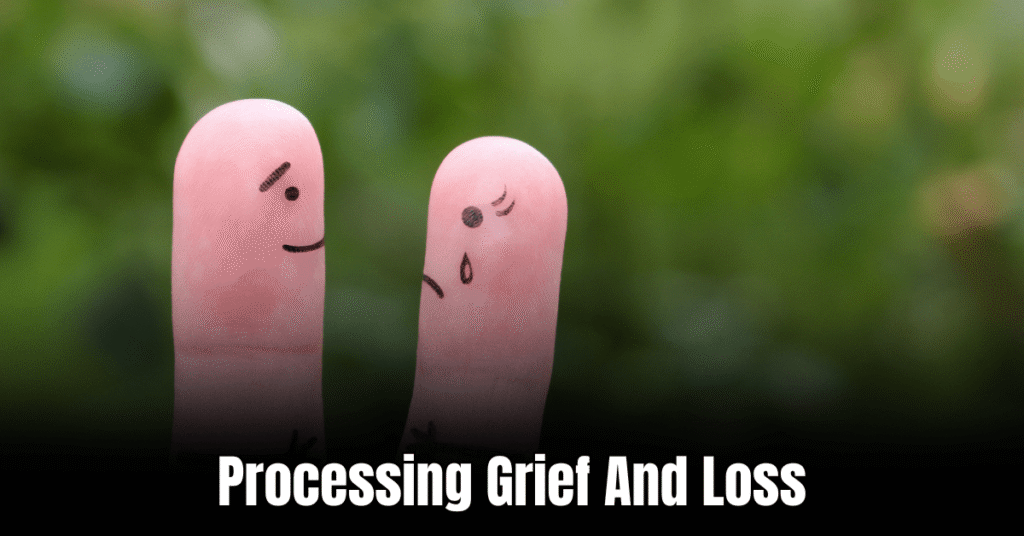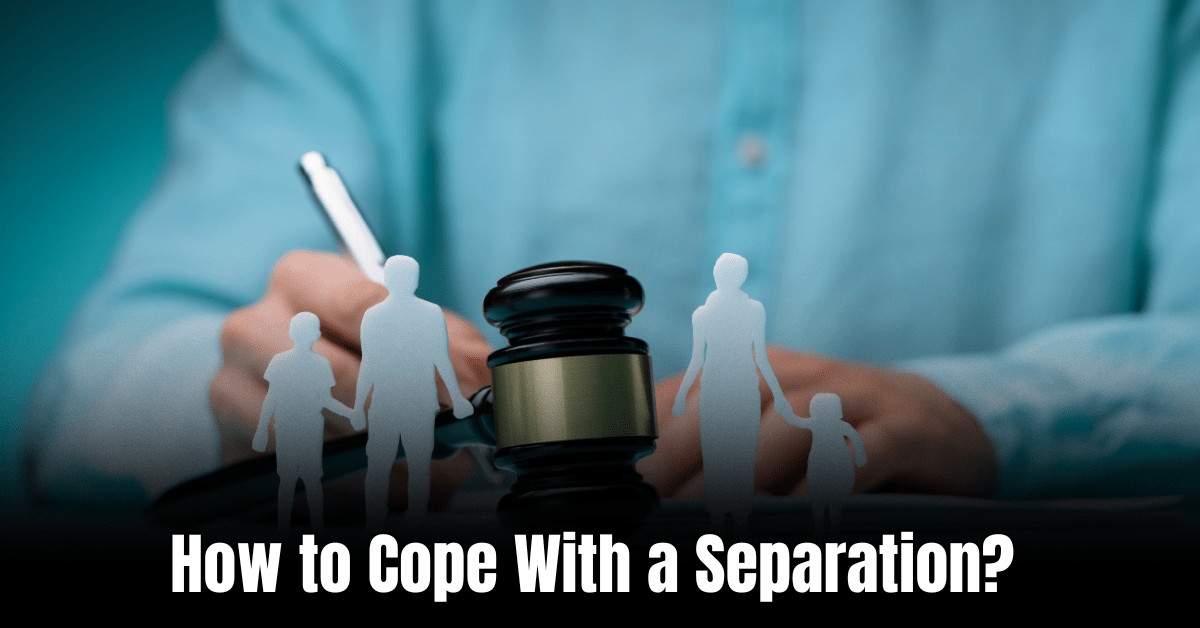To cope with a separation, seek support from loved ones, consider therapy, and focus on self-care and growth. Going through a separation can be an extremely challenging and emotional experience.
Whether it’s a breakup, divorce, or a separation from a long-term partner, it can cause a tremendous amount of pain and upheaval. During this difficult time, it is essential to find healthy ways to cope and move forward. We will explore some practical strategies to help you deal with a separation.
By seeking support from loved ones, considering therapy, focusing on self-care, and embracing personal growth, you can navigate this challenging period and emerge stronger and more resilient. It’s time to take control of your healing process and create a better future for yourself.
Recognizing And Acknowledging Your Emotions
It is essential to understand the range of emotions associated with a separation. Separation can bring about a mix of feelings such as sadness, anger, confusion, and even relief. Recognizing and acknowledging these emotions allows you to start the healing process. Take the time to reflect on and identify your feelings. Don’t dismiss or push them aside, as ignoring them can lead to further emotional distress. Exploring healthy ways to express emotions can be beneficial in dealing with the effects of a separation. Consider writing in a journal, talking to a trusted friend or therapist, or engaging in activities that help channel and release your emotions. Give yourself permission to grieve and process your feelings during this challenging time, remembering that healing takes time and self-care is essential.
Building Strong Support Systems
Handling a separation can be challenging, but building strong support systems can make the process easier. Surrounding yourself with caring friends and family, seeking professional help, and joining support groups are effective ways to cope with the difficulties of separation.
| Building Strong Support Systems |
| Going through a separation can be an incredibly challenging experience. It is essential to have strong support systems in place to help you cope and navigate through this difficult time. |
| Seeking support from trusted friends and family can provide much-needed emotional support. Having people who listen without judgment and offer a shoulder to lean on can make a significant difference in your healing process. |
| Engaging in therapy or counseling is another valuable resource. A professional can help you gain insight into your emotions, provide coping strategies, and guide you towards personal growth. |
| Joining support groups or online communities specifically for individuals going through a separation can be beneficial. These platforms offer a chance to connect with others who understand and share similar experiences. It can be comforting to know that you are not alone. |
Taking Care Of Your Physical And Mental Well-being
Taking Care of Your Physical and Mental Well-being
During a separation, it is important to prioritize self-care activities to maintain your overall well-being. Establishing healthy routines and habits can provide structure and stability during this challenging time. Try to incorporate activities that bring you joy and relaxation, such as reading, taking a bath, or practicing mindfulness.
Engaging in regular exercise and physical activity can also have a positive impact on your physical and mental health. Consider incorporating activities like walking, jogging, or attending fitness classes into your routine. Not only can exercise help reduce stress and improve mood, but it can also boost your energy levels.
Nurturing Your Emotional Resilience
Separation can be a challenging time, but nurturing your emotional resilience is essential for moving forward. Cultivating a positive mindset can help you navigate the ups and downs that come with separation. It’s important to practice mindfulness and relaxation techniques to help manage stress and anxiety. Taking time to focus on the present moment and engage in activities like yoga or meditation can promote a sense of calm and well-being.
Another way to nurture your emotional resilience is by setting goals and focusing on personal growth. By identifying what you want to achieve and taking steps towards those goals, you can regain a sense of control and purpose in your life. This can involve learning new skills, exploring hobbies, or pursuing career opportunities.
Remember, coping with a separation is a process, and it’s essential to be patient and compassionate with yourself. By nurturing your emotional resilience through a positive mindset and personal growth, you can navigate this challenging time and emerge stronger than before.
Communicating Effectively
When going through a separation, effective communication is crucial to navigate the process and maintain a healthier relationship moving forward. To establish clear boundaries and expectations, it is vital to have open and honest conversations with your partner.
One way to do this is by learning effective communication strategies. This involves avoiding blame or criticism and instead focusing on expressing your needs and feelings calmly and respectfully. Active and empathetic listening is equally important in effective communication. By genuinely listening to your partner, you can understand their perspective and validate their feelings.
Setting boundaries and expectations requires open dialogue. Discussing your needs, desires, and concerns can help establish a mutual understanding and avoid misunderstandings or conflicts in the future. It is also helpful to establish guidelines for communication, such as using “I” statements instead of “you” statements, and creating a safe space where both parties can express themselves without judgment.
By prioritizing effective communication, you can cope with a separation more effectively and potentially pave the way for a healthier relationship with your partner.

Processing Grief And Loss
Understanding the stages of grief: Grief is a natural response to separation and loss. It is essential to understand the stages of grief, which include denial, anger, bargaining, depression, and acceptance. Each individual may experience these stages differently and in a different order. It is essential to give yourself time and space to go through these stages at your own pace.
Allowing yourself to grieve and heal: It is crucial to allow yourself to grieve and acknowledge your feelings. This can be done by expressing your emotions through journaling, talking to a trusted friend or counselor, or engaging in creative activities such as art or music. Honoring your emotions and giving yourself permission to feel is an essential step in the healing process.
Exploring healthy ways to cope with loss: While grieving, it is necessary to find healthy coping mechanisms. This may include engaging in self-care activities like regular exercise, getting enough sleep, and eating well. Additionally, seeking support from a support group or therapist can provide a safe space to process your emotions. Engaging in activities that bring you joy and practicing relaxation techniques such as meditation or deep breathing can also aid in coping with loss.
Rediscovering Yourself
Separation can be a challenging time, but it also presents an opportunity for self-discovery and personal growth. Exploring new hobbies and interests can help you broaden your horizons and find new sources of joy and fulfillment. Whether it’s picking up a musical instrument, learning a new language, or taking up painting, engaging in activities that bring you joy can be a great way to cope with a separation.
Setting new personal goals can give you a sense of purpose and direction. It could be pursuing a new career path, improving your fitness, or starting a new business venture. Setting achievable goals and working towards them can provide you with a positive focus and help you regain your confidence.
Reflecting on your personal strengths and values is another crucial aspect of rediscovering yourself. This self-reflection can help you understand your own worth and what truly matters to you. It can also guide you in making choices that align with your values and lead to a more fulfilling life.
Establishing A Co-parenting Plan
Establishing a co-parenting plan is crucial when it comes to coping with a separation. The well-being of children should always be prioritized during this process. Effective communication with the co-parent plays a key role in ensuring smooth co-parenting. It is essential to have open and honest discussions about the children’s needs and concerns. Creating a structured co-parenting schedule helps provide stability and predictability for the children.
Managing Financial Challenges
When going through a separation, one of the key challenges to manage is the financial aspect. It is important to assess your financial situation carefully to gain clarity on your current financial position. If required, seek professional advice from a financial planner or advisor who can guide you through this process. Setting a budget is crucial during this time as it helps you understand your expenses and income. Consider your financial goals and try to develop a plan to achieve them. This may involve cutting back on unnecessary expenses, finding ways to increase your income, or exploring opportunities to save or invest. Remember, being proactive and taking control of your finances can provide a sense of stability during a separation.+
Embracing Change And Moving Forward
Coping with a separation can be challenging, but it’s essential to embrace the changes that come with it and move forward. Accepting the reality of the separation is the first step in healing and finding a way to rebuild your life. It’s natural to feel hurt and lost, but by focusing on embracing new opportunities and possibilities, you can start to create a brighter future for yourself. This is a chance to rediscover who you are and what you want in life. Take this time to prioritize personal growth and self-care, as it is key to creating a fulfilling life after a separation. Surround yourself with supportive friends and family, seek professional help if needed, and stay open to new experiences. Remember, this is just a chapter in your life, and there are infinite possibilities ahead.
Frequently Asked Questions About How To Cope With A Separation
Q: How Can I Cope With A Separation Emotionally?
A: Focus on self-care, seek support from friends and family, and consider therapy or counseling.
Q: What Are Some Healthy Coping Strategies For Separation?
A: Engage in activities that bring you joy, practice mindfulness, exercise regularly, and journal your thoughts and feelings.
Q: Is It Normal To Feel Overwhelmed During A Separation?
A: Yes, it’s completely normal to feel overwhelmed. Give yourself time to heal and reach out for support when needed.
Q: How Can I Effectively Communicate With My Ex-partner During A Separation?
A: Maintain open and respectful communication, establish boundaries, and consider seeking mediation if necessary.
Q: What Should I Do If My Children Are Struggling With The Separation?
A: Be honest with them, provide reassurance and support, encourage open dialogue, and consider therapy for professional guidance.
Q: How Long Does It Take To Recover From A Separation?
A: There is no set timeline for recovery. Focus on self-care, seek support, and allow yourself to heal at your own pace.
Conclusion
Navigating through a separation can be a challenging and emotional journey. By focusing on self-care, seeking support from loved ones, and allowing yourself to heal at your own pace, you can begin to cope with the pain and uncertainty. Remember, each individual’s experience is unique, but with time and resilience, you will find your inner strength and emerge stronger than ever before.
Ismail Hossain is the founder of Law Advised. He is an Divorce, Separation, marriage lawyer. Follow him.





Leave a Reply